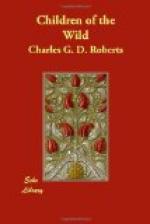“But Little Silk Wing seems to have been born to illustrate the dangers which beset the life of the stay-at-home. For two days there had been an unwonted disturbance in the deep-grassed meadow that surrounded the barn. There had been the clanking of harness, the long, shrill, vibrant clatter of the scarlet mowing machine, the snorting of horses, and the shouting and laughter of men turning the fresh hay with their forks. Then came carts and children, with shrill laughter and screams of merriment, and the hay was hauled into the barn, load after load, fragrant, crackling with grasshoppers; and presently the mows began to fill up till the men with the pitchforks, sweating over the hot work of stowing the hay, came up beneath the eaves.
“Reluctantly and indignantly the bats woke up. Some of them, as the loads came in with noisy children on top, bestirred themselves sufficiently to shake the sleep out of their eyes, unfold their draped wings, flutter down into the daylight, and fly off to the peaceful gloom of the nearest woods.
“But the mother of Little Silk Wing was not so easily disturbed. She opened her tiny black beads of eyes as wide as she could, but gave no other sign of having noticed the invaders of the old barn’s drowsy peace. She had seen such excitement before, and never known any harm to come of it. And she hated flying out into the full glare of the sun.
“But there is such a thing, you know, as being a bit too calm and self-possessed. As the hay got higher up in the mow, beyond the eaves, and almost up to the level of the topmost beam, one of the farm hands noticed the little bat hanging under the ridgepole. He was one of those dull fools, not cruel at heart, perhaps, but utterly without imagination, who, if they see something interesting, are apt to kill it just because they don’t know any other way to show their interest. He up with the handle of his pitchfork and knocked the poor little mother bat far out into the stubble.”
“Oh!” cried the Child. “Didn’t it hurt her dreadfully?”




